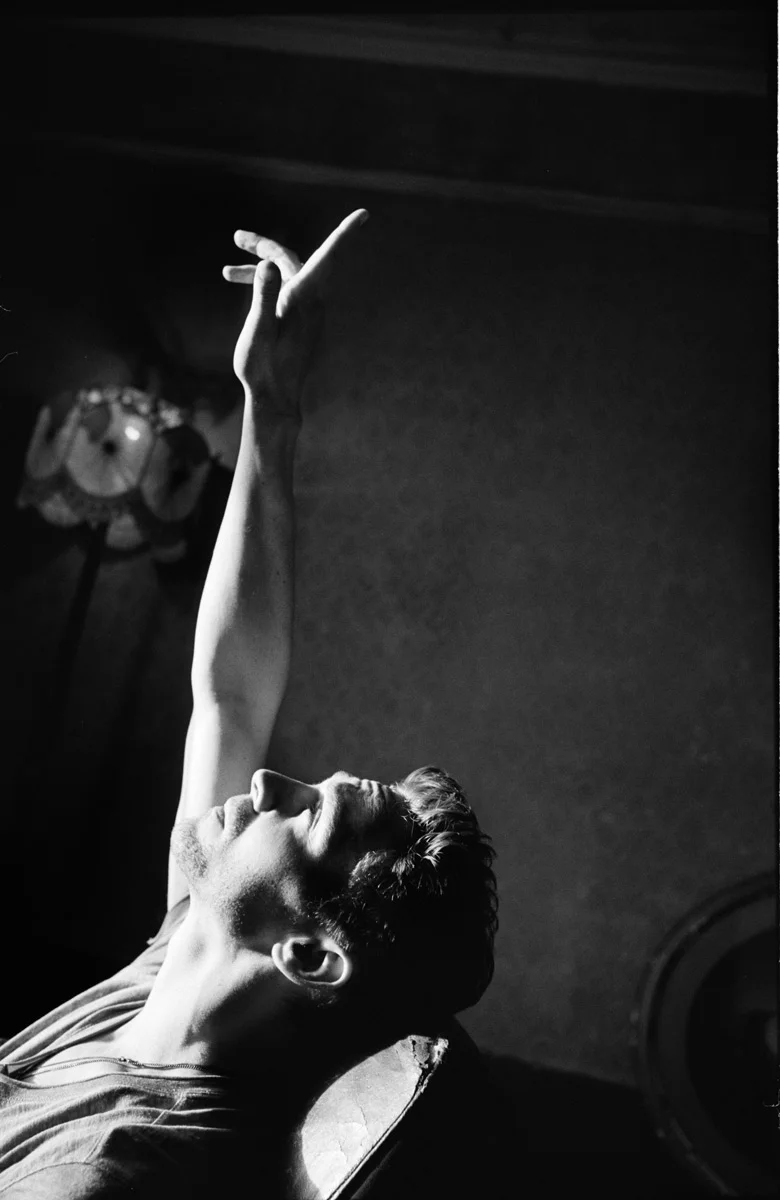
T-shirt by John Varvatos
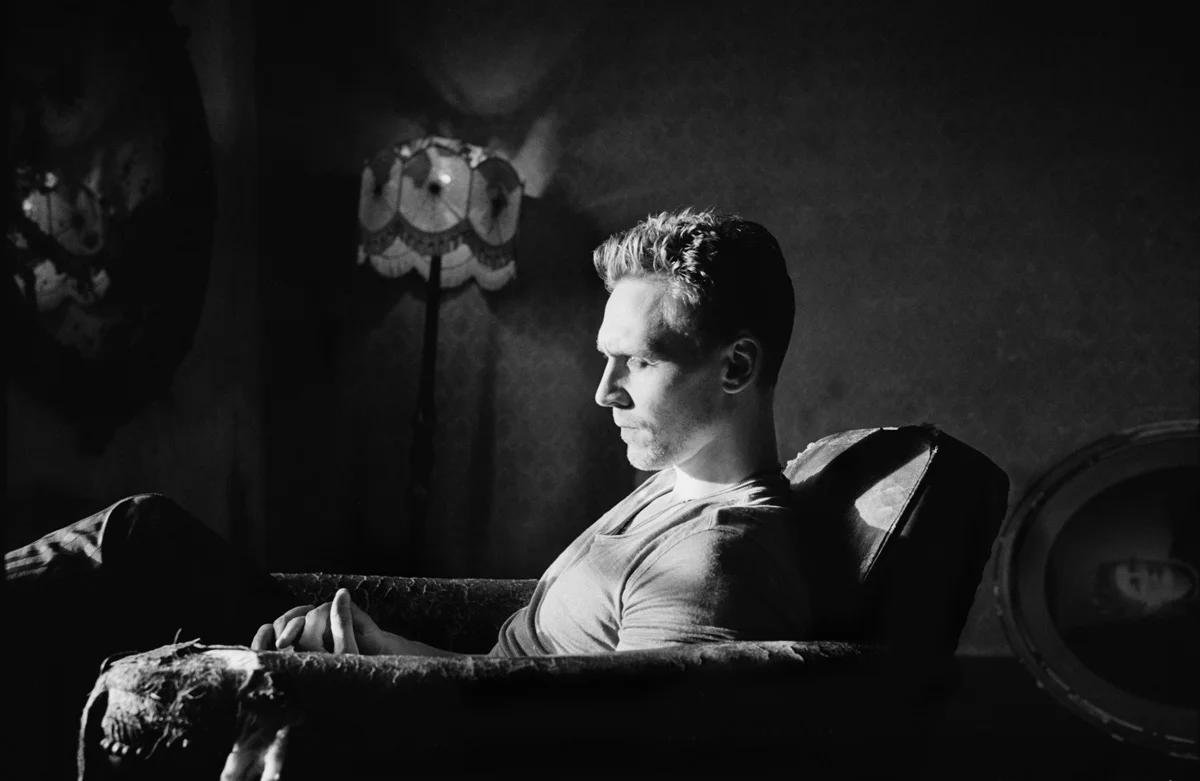
T-shirt by John Varvatos
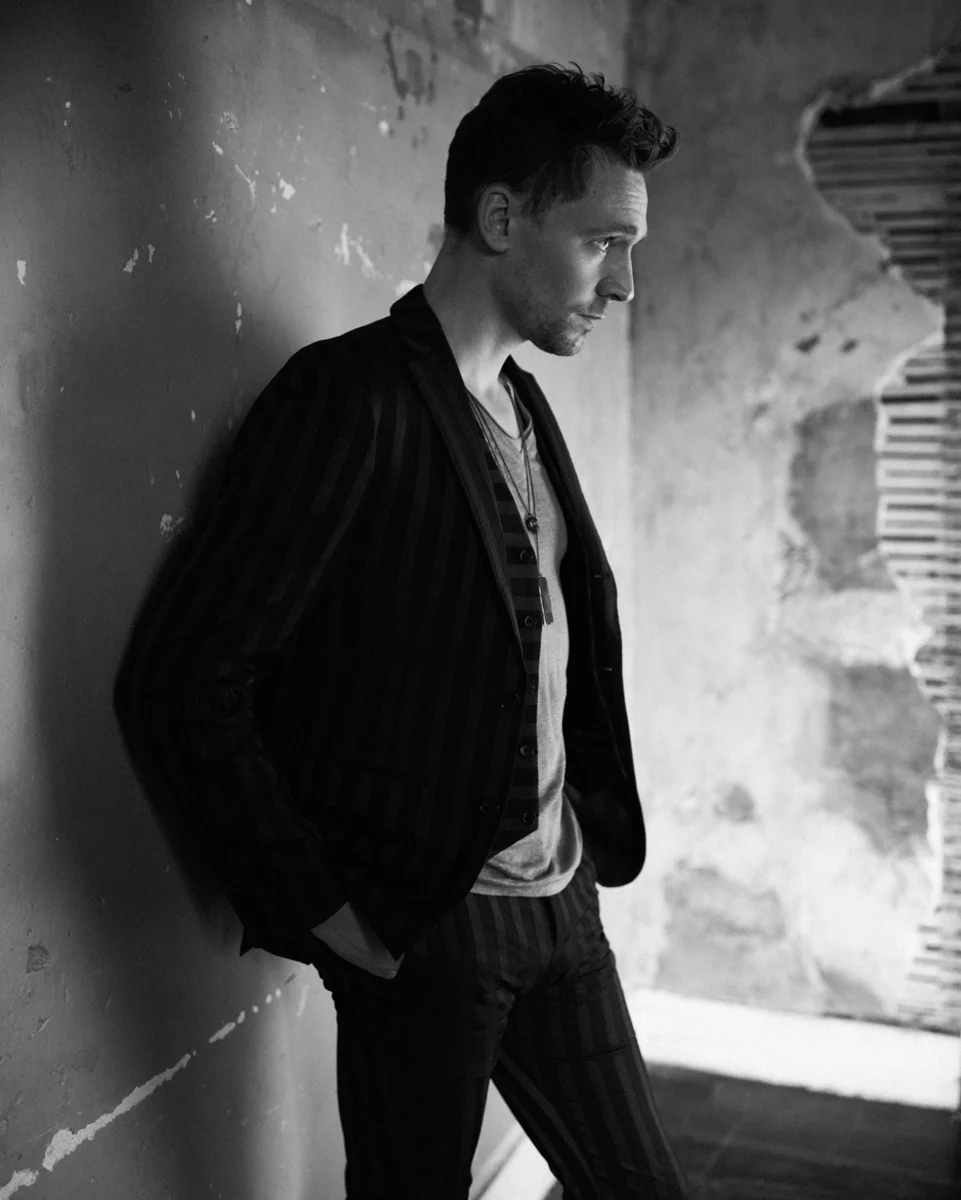
Striped suit by Acne, t-shirt by John Varvatos, chain by Pyrrha, and chain and ring by Duffy.
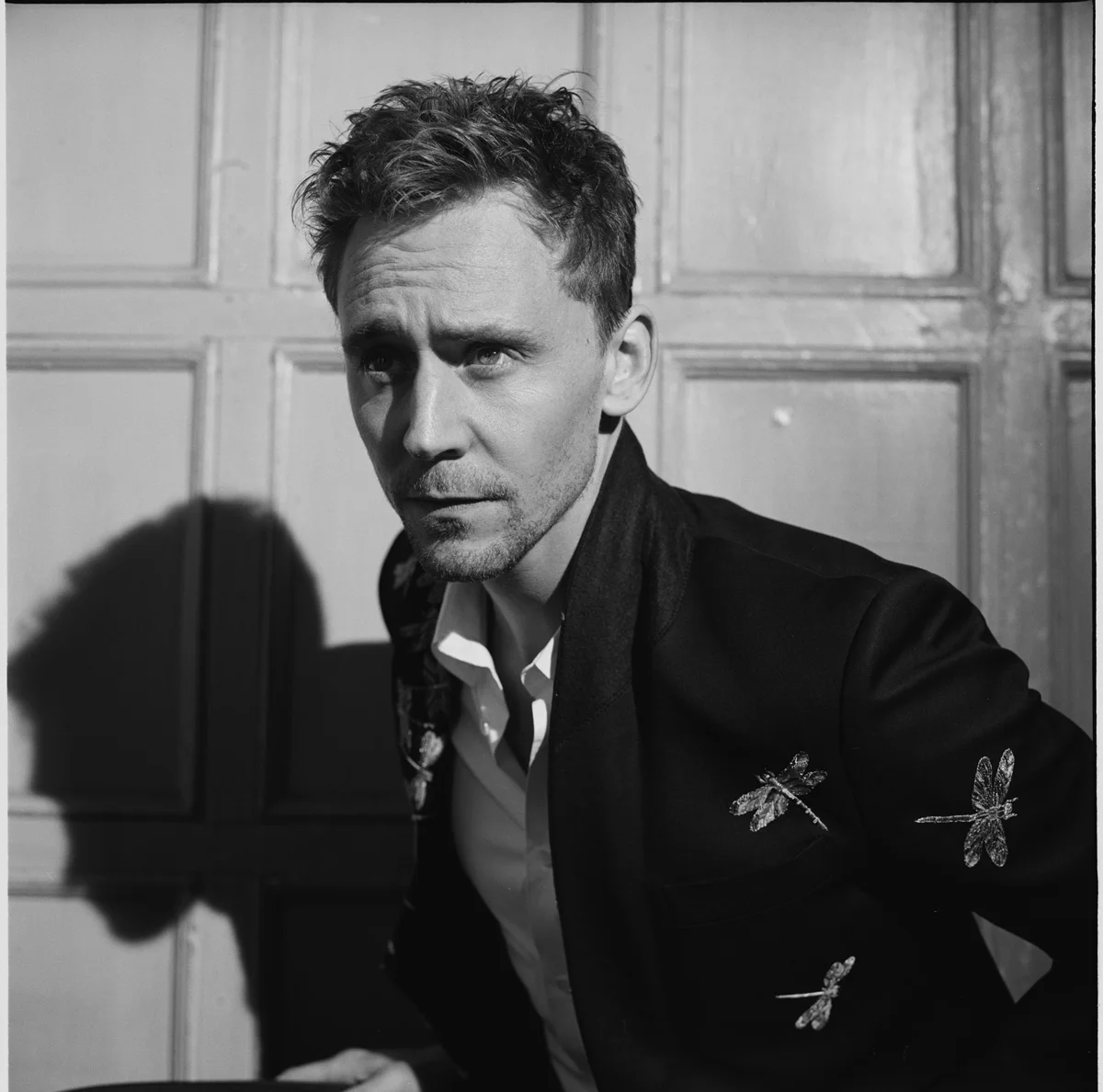
Embroidered jacket and button-down shirt by Alexander McQueen.
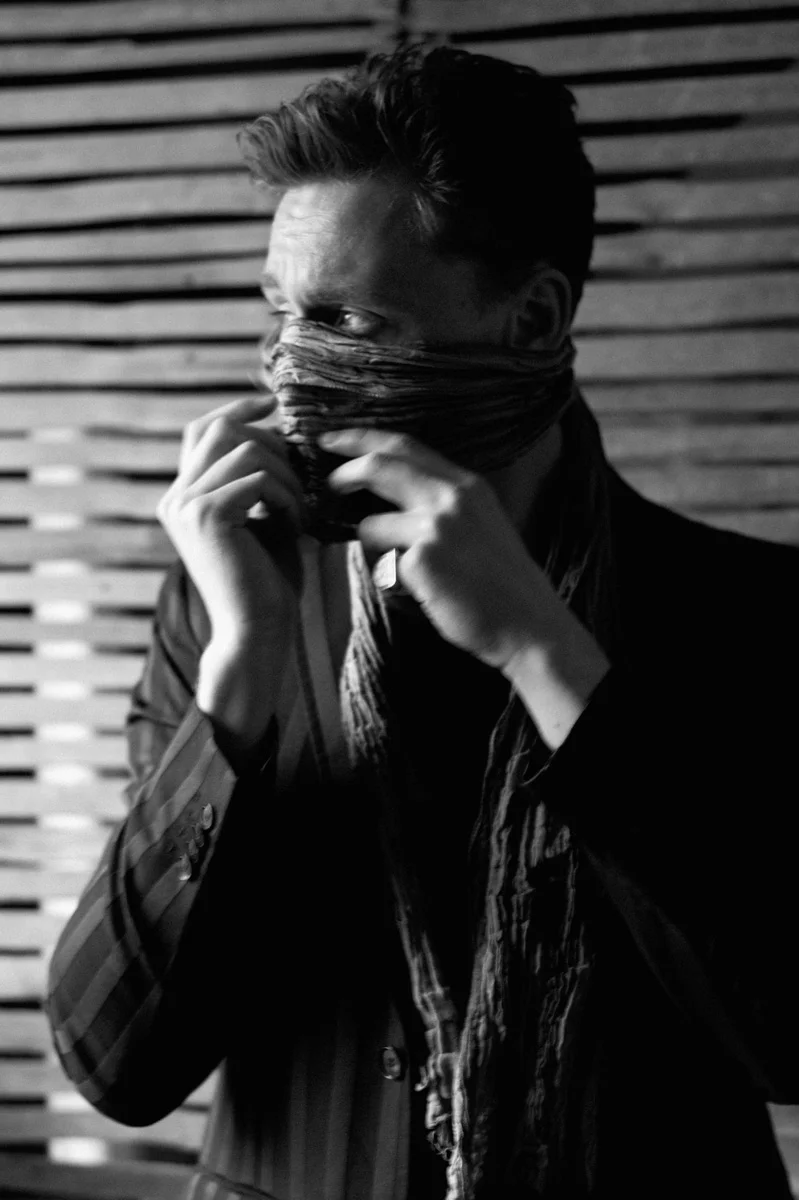
Striped suit by Acne, T-shirt and scarf by John Varvatos, Chain by Pyrrha, and Chain and ring by Duffy.
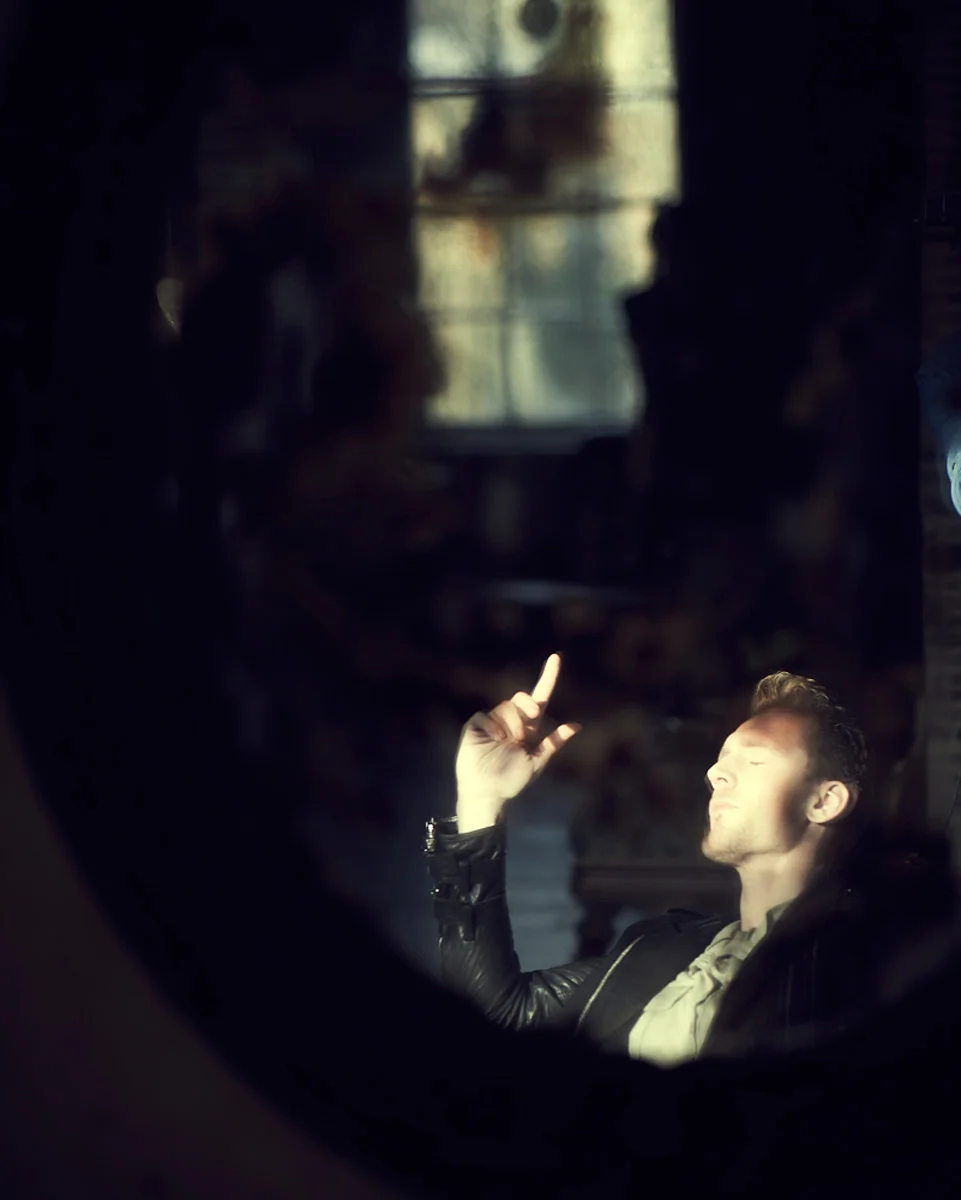
Leather jacket by Balmain.
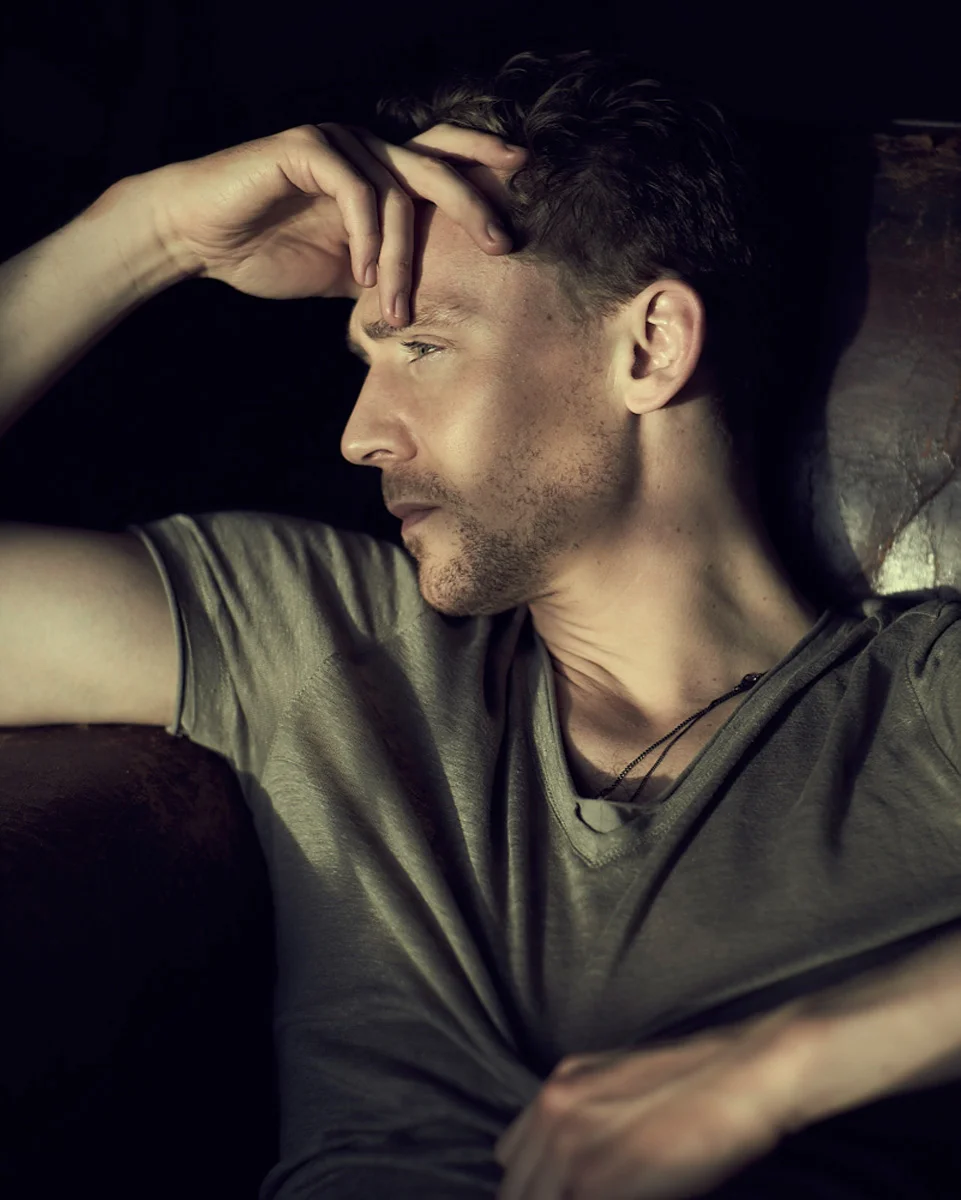
T-shirt by John Varvatos.
[](#)[](#)
Tom Hiddleston
It’s Not Absract, This Kindness
"I told you I’d speak in loose metaphors, by the way,” says Tom Hiddleston with a wry smile over Earl Grey tea and a slice of lemon cake, as he begins to pick apart the perspective-shattering experience he’s just had as a UNICEF representative in Guinea, West Africa. It’s not quite the interview I was expecting from the star of blockbuster Tinseltown fare like _Thor_, but it’s a damn sight more interesting than long diatribes about process, method and the fabulousity of pool parties and endless cocktails. Then again, maybe it’s not totally unexpected. Hiddleston did make his name in the heart-wrenching WWI drama _War Horse_, after all.
“Every time you consider a job, you have to check in with your inner compass and say, ‘Does this fit in with how I see what the work is for? Is this going to be something interesting and valuable to contribute to the world?’” He’s reconciling his experience in one of the world’s most devastatingly needy countries with his occupation which, by his own admission, can seem “flippant” in comparison to the work of those on the frontline of fighting world poverty. “All I am, really, is a sort-of town crier,” he continues, elaborating on his role at the charity. “I’m someone who can write about it and make people aware, but I’m not distributing vaccines; I’m not organizing transportation; I can’t make fortified milk for infants who are malnourished; I can’t build schools and find jobs and build training systems; I’m not a chemist; I’m not an engineer; I’m not a politician—I’m just in the position where people, some people, a few people, will read what I’ve got to say.”
And what he does have to say offers a remarkably poetic take on the situation, which is refreshingly heartfelt and introspective when compared to straight-faced, albeit brave reportage from hardened field journalists. His perspective is in no small part due to his love of the abstract metaphor. For instance, he wrote the following in one of his UNICEF blogs: “_I feel as though the cardboard box of my own reality has been flattened and blown open. Now I can see the edge of the world_.”
It’s clear Hiddleston is moved and still buzzing from his experience in Africa, because throughout our meeting he repeatedly stops in reflection and mentions just how excited he feels about life at the moment, positively brimming with optimism and inspiration.
“I went for a jog with Julien Harneis, who runs UNICEF in Guinea,” he says. “It was very early in the morning and we ran along the river—it was absolutely beautiful, one of the most beautiful sunrises I’ve ever seen. When you go for a run early in the morning and you’re half asleep, your mind is so open and you’re almost impolite in your lack of censorship because you just speak what’s in your heart. We started talking about this idea that every day in any life is a creative act—it’s one step closer to becoming the person you want to be. We’re all playing roles all the time. At the moment, I’m playing the role of the person being interviewed and you’re playing the role of the person interviewing me...” He breaks off for a moment, deep in the existential thoughts that dominate our conversation. “But this guy, Julien, who was saying this to me, said, ‘This is who I want to be. I believe in public service. I believe in trying to leave a footprint that is positive and helpful even if it’s washed away by the tide when I’m gone.’ That single statement has rearranged my head in terms of how I think about acting, how I think about my personal relationships. It was an amazing thing.”
Hiddleston’s academic grounding, scoring a double first in Classics at Cambridge University, has set him up with an inquisitive rigor that inveigles a wish to mull over existential issues, such as identity, time and the best way to spend it. “The most exciting question,” he argues passionately, “and I say this with the cleanest slate, is, ‘Who do you want to be?’ I find people who are brave enough to be honest about their vulnerability or their ignorance really moving – you know, when you get people who are older who have done amazing things turn around and say ‘I still don’t know what I’m doing...’ That is incredible. Spielberg’s like that. I don’t mean to just drop his name in, but he is so humble. He’s like, ‘I’m still not sure I know how to do this. I mean, I think I know, then, every time I make a film, I learn something I didn’t know before about people or filmmaking or a story—that’s why I’m still here.’ You hear him say that and you’re like, ‘... amazing.’”
Hiddleston is given to lofty philosophizing and has plunged himself into the stark realities of African poverty, but he still has to somehow square these thoughts with his job as an actor. “It’s made me question the contribution of a project, and it’s made me resolve only to attach myself to projects where I believe in what that film or piece of writing is going to communicate to the world,” he says. “It doesn’t matter if I have to go through some terrible hardship in order to play the part as long as the whole is inspiring and has a good impact. The reason I’m here, the reason I became an actor is because, sat there in the audience, my world was once changed by a film or by a piece of theatre; something like _The Remains of the Day_—which I just think is such a beautiful film—or _The Constant Gardener_, or any of the films that Danny Boyle makes. It’s that feeling when you see a film and it’s changed the way you think about something. It’s touched you; there’s something about it that you believe in.”
Hiddleston references Michael Haneke’s _Amour_ as a piece of cinema that does some good in the world. “That film is like a mountain. It’s a piece of wisdom that is in the background every day and Haneke has just shown it, saying, ‘So, you know, this is what you want. This is the intimacy that you’ll be lucky to have when you get to the end of your life...’ When I saw it, I couldn’t stop thinking about that film for an entire month. It just made everything else seem so flippant and disposable.” In the context of his own work, Hiddleston cites _The Hollow Crown_ for the BBC as something he is particularly proud of. “I think those films are intrinsically of use in the world.” But he argues that an epic blockbuster has just as much potential to touch hearts as a low-budget indie film. He isn’t an actor so self-conscious of his career that he feels the need to balance major movies with smaller projects to cultivate a particular image. “It doesn’t matter if they’re spending 150 million dollars on it or fifteen hundred—the job’s the same. Your job as an actor is to represent the truth of human nature in whatever shade or color it comes to serve the story. I love _War Horse_. I remember reading the script and it made me cry because it was about decency, and the horse is a kind of vessel or a metaphor for our capacity for kindness in a difficult situation.” He grows more thoughtful when touching on the film that made him a household name, and graduates from self-exploratory questions of what it means to him to produce worthwhile work to the colossal matter of time itself. “The Guinea trip made me feel like I’m useful, and that really is what any human being wants to feel, that they’re useful in the world. It becomes problematic when you start feeling useless. I’ve always been plagued by this question: ‘What is the best use of my time on this planet?’ And doing all of that has been so rewarding because it’s quite clearly a good use of time.”
Time has been on Hiddleston’s mind not least because of his role as a vampire in Jim Jarmusch’s upcoming picture _Only Lovers Left Alive_. With eternity on their side, vampire lovers with the loaded names Adam and Eve, played by Hiddleston and Tilda Swinton, stretch the idea of “forever in love” to its actualization. “They are opposite and yet they are equal. I think the idea of them being vampires was about immortality. If you could live forever, how would that frame and challenge your commitment to each other—if forever meant forever? It could mean you’d take a break. It wouldn’t just be a week break; it would be seven years.”
The questions of “ends” and “purpose” seem to also be haunting Hiddleston of late. He explains how an encounter with a doctor brought such haunting thoughts to the fore during a routine health check that would typically be nothing more than a box-ticking exercise. Hiddleston expected this particular visit to go the way of file, check blood pressure, ask how he’s feeling and send him on his way. However, this appointment was with a doctor who offered a little more than medical advice. “He was knocking my knees with his hammer to test my reactions and he said, ‘Do you have family?’ and I said, ‘I have a family but I don’t have children,’ he said, ‘Do you want children?’ and I said, ‘Yes, very much one day.’ and he said, ‘It’s amazing, I’m in my mid-60s and I’m pleased to say that life has got immeasurably better with every decade', and I know how lucky I am because lots of people can’t say that, because for them life gets worse, but you see the thing is, the question that eludes most of us is _Who are we really?_’ I mean, this guy has such skill, and was such an educated Harley Street doctor, who had run a practice for many years, and there we were on a Friday morning in January having this conversation. It was incredible because he was saying that’s the grit in the pearl of the oyster—if you can get through all the other stuff about life, paying the bills and trying to do the right thing and basically looking after yourself and living with dignity, then the fun stuff is trying to answer that question.”
Seeking to answer this question has only been intensified for Hiddleston since visiting Guinea. But the relentless tick-ticking of time that he evidently hears doesn’t seem to rattle him; rather, it motivates him. “I am an optimist. I choose to be,” he says. “There is a lot of darkness in our world, there is a lot of pain and you can either choose to see that or you can choose to see the joy. If you try to respond positively to the world, you’ll spend your time better. If you respond negatively, you might one day look back and say, ‘Why did I spend the whole time complaining? Why didn’t I acknowledge the stuff I have, never mind the stuff I didn’t have?’ I’m a glass-half-full person, simply because it’s a better use of my time.”
As if to illustrate his earlier point about worthwhile pieces of writing, Hiddleston then references the work of legendary playwright Chekhov, seemingly apropos of nothing. “Chekhov is a genius because his plays dramatize the moment in people’s lives at a particular time, at a particular place in history. His characters, quite suddenly, in middle age realize that there’s an hourglass—there’s a clock that is ticking—and that there’s more sand at the bottom than at the top, and the more they look at it the faster the sand seems to go. And the reason these plays are so funny and so sad is because people are suddenly cursed with regret because they misused their time: they married the wrong woman; they ploughed the crops wrong; they lived in the wrong town; they never went to Moscow. It’s a motivating factor to realize that it’s a short life, so we should use it well.”
#### _Photographer_: Jason Hetherington for EllisonLee.com.
#### _Fashion Editor_: Rose Forde at RoseForde.com.
#### _Groomer_: Amanda Grossman for FrankAgency.co.uk.
#### _Producer_: Seona Taylor-Bell.
#### _Fashion Assistant_: Sophie Lillie Rees.
#### Grooming Notes: Ultra Light Bai Ji Hydrator, Protecting Vitamin Lipsaver, and Hydrate Desert Bloom Intense Hand Rescue by Molton Brown. Matte, But Never Dull by John Allan’s.
